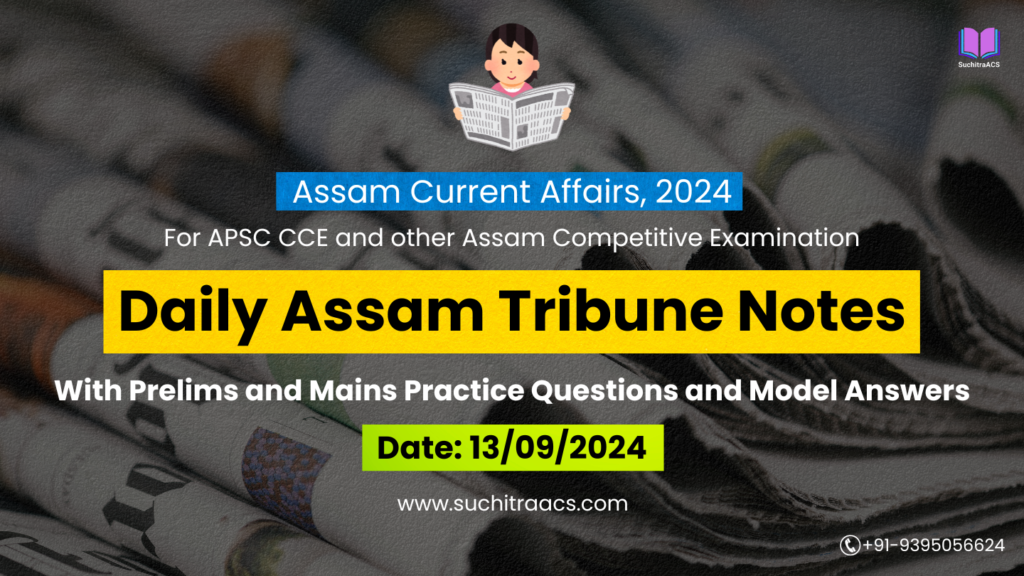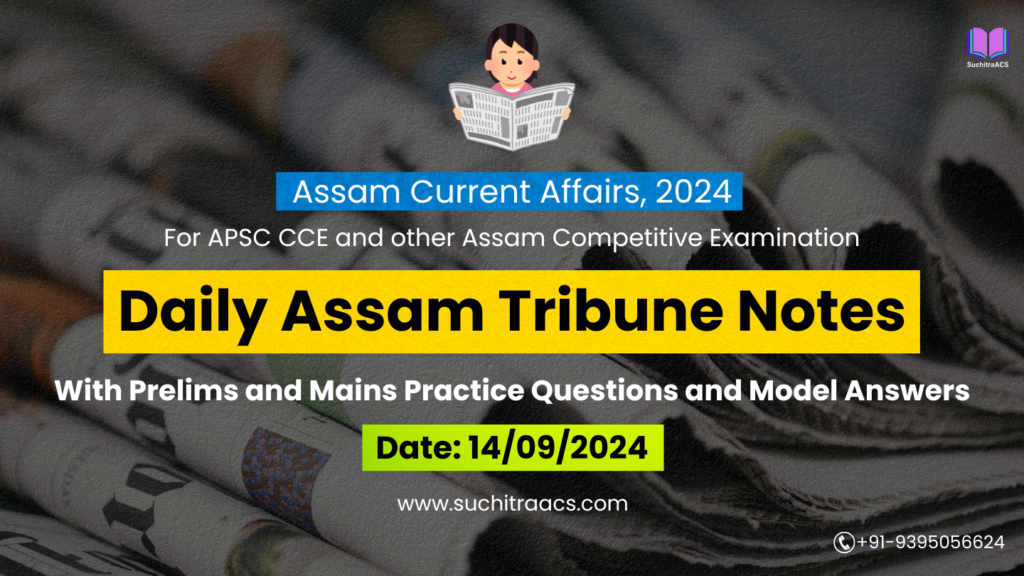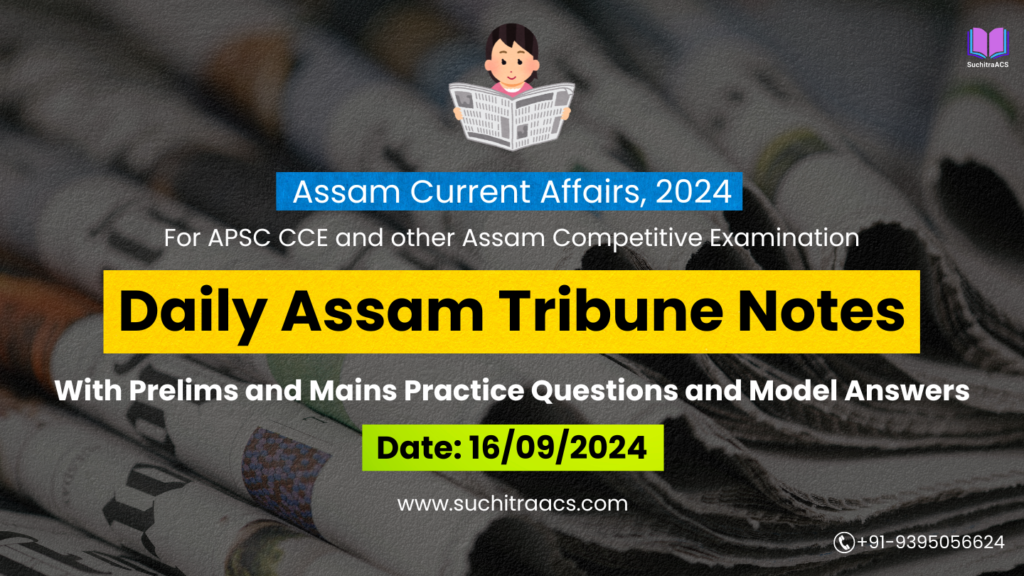1. Clause 6 of the Assam Accord
- Mains Perspective (GS-V)
- Context: The Assam Accord (1985) was a Memorandum of Settlement signed between the Government of India and the leaders of the Assam Movement to address the issue of illegal immigration in Assam. Clause 6 of the Accord promises constitutional safeguards for the indigenous people of Assam.
- Key Recommendations of the Justice Biplab Sarma Committee:
- Implementation of 80% reservation in the Assembly, Parliament, and local bodies for indigenous people.
- Introduction of the Inner Line Permit (ILP) system in the State.
- Creation of an Upper House in the State Legislature.
- Reservation in jobs for indigenous people.
- Challenges:
- Implementation of some recommendations requires amendments to the Constitution of India, necessitating Central Government action.
- Balancing the interests of various communities in Assam while protecting the rights of indigenous people.
- Significance: Implementation of Clause 6 is crucial for protecting the cultural, linguistic, and social identity of the indigenous people of Assam and ensuring their political and economic rights.
- Prelims Perspective (GS-I)
- Assam Accord (1985)
- Clause 6 of the Assam Accord
- Justice Biplab Sarma Committee
- Inner Line Permit (ILP) system
2. Israel-Hamas Conflict
- Mains Perspective (GS-II & V)
- Context: The ongoing conflict between Israel and Hamas has escalated, resulting in a significant humanitarian crisis in Gaza and a deteriorating security situation in the region.
- Key Issues:
- The massive Israeli bombardment has caused a high number of casualties and displacement in Gaza.
- The conflict has the potential to escalate into a full-scale war between Israel and Hezbollah, further destabilizing the region.
- The humanitarian crisis in Gaza is worsening, with thousands of people fleeing their homes and seeking shelter.
- India’s Stance: India has called for a ceasefire, the release of hostages, and a return to dialogue and diplomacy. India also supports a two-state solution as the only path to enduring peace and stability in the region.
- Challenges:
- The deep-rooted historical and political complexities of the conflict make finding a lasting solution challenging.
- The involvement of various regional and international actors further complicates the situation.
- The humanitarian crisis in Gaza requires urgent attention and international cooperation.
- Prelims Perspective (GS-I)
- Hamas
- Hezbollah
- Gaza Strip
- West Bank
- Two-state solution
- India’s position on the Israel-Palestine issue
3. Dengue Outbreak in Assam
- Mains Perspective (GS-III & V)
- Context: Assam is experiencing a significant surge in dengue cases, with over 1,000 positive cases reported across the State.
- Key Concerns:
- The increasing number of dengue cases poses a public health challenge in Assam.
- The outbreak highlights the need for effective disease surveillance and control measures.
- The impact of climate change on the spread of vector-borne diseases like dengue.
- Government’s Response:
- The Health Department has sent a high-level team to Dima Hasao to assess the situation and take necessary measures.
- Extensive source reduction drives and awareness campaigns are being conducted in affected areas.
- Way Forward:
- Strengthening disease surveillance and early warning systems.
- Implementing integrated vector management strategies.
- Raising public awareness about dengue prevention and control.
- Addressing the environmental factors contributing to the spread of dengue.
- Prelims Perspective (GS-I)
- Dengue fever
- Aedes aegypti mosquito
- Vector-borne diseases
- National Vector Borne Disease Control Programme (NVBDCP)
4. Fake GST Registrations
- Mains Perspective (GS-III)
- Context: Tax officers have detected around 10,700 fake registrations under the Goods and Services Tax (GST), involving evasion of Rs 10,179 crore.
- Key Concerns:
- Fake GST registrations lead to significant revenue loss for the government.
- They create unfair competition for legitimate businesses.
- They undermine the integrity of the GST system.
- Government’s Response:
- The government is conducting all-India drives against fake companies.
- Aadhaar authentication of GST registration is being implemented in several states.
- Targeted action and physical verification are being undertaken to check fake registrations.
- Way Forward:
- Strengthening the GST registration process to prevent fraudulent activities
- Leveraging technology for better data analysis and risk profiling of taxpayers
- Enhancing coordination between tax authorities and other enforcement agencies
- Prelims Perspective (GS-I)
- Goods and Services Tax (GST)
- GSTIN (GST Identification Number)
- Central Board of Indirect Taxes and Customs (CBIC)
- Aadhaar authentication
5. Sensex at Record High
- Mains Perspective (GS-III)
- Context: The Sensex has surpassed 85,000 for the first time, reflecting a robust bull run in the Indian stock market.
- Positive Factors:
- Global factors: US Fed rate cut, actions by the Chinese central bank
- National factors: Government policy continuity, strong foreign inflows, consumption pickup, capital expenditure growth
- Challenges:
- Escalating geopolitical concerns in the Middle East
- Potential impact of global economic slowdown
- Significance:
- A strong stock market indicates investor confidence in the Indian economy
- It can attract more foreign investment and boost economic growth
- Prelims Perspective (GS-I)
- Sensex
- Nifty
- Bull run
- Bear market
- Securities and Exchange Board of India (SEBI)
6. European Commission’s Aid to Farmers
- Mains Perspective (GS-III)
- Context: The European Commission has proposed financial support of 119.7 million euros for farmers in several European countries impacted by severe weather.
- Key Concerns:
- Climate change is leading to extreme weather conditions, affecting agricultural production and farmers’ livelihoods
- The need for financial assistance and support for farmers to cope with the impact of climate change
- EU’s Response:
- The EU is providing financial aid to farmers affected by adverse weather conditions
- The funds will be drawn from the EU’s Common Agricultural Policy (CAP)
- Significance:
- The EU’s support highlights the importance of addressing the impact of climate change on agriculture
- It demonstrates the EU’s commitment to supporting farmers and ensuring food security
- Prelims Perspective (GS-I)
- European Commission
- Common Agricultural Policy (CAP)
- Climate change and its impact on agriculture
7. Sweden’s Accusations Against Iran
- Mains Perspective (GS-II)
- Context: Swedish authorities have accused Iran of being responsible for sending thousands of text messages calling for revenge over the burnings of the Quran in 2023
- Key Issues:
- The incident highlights the potential for cyberattacks and disinformation campaigns to be used to incite violence and create social unrest
- It raises concerns about the role of state actors in spreading hate speech and inciting violence
- The incident also underscores the challenges of balancing freedom of speech with respect for religious beliefs
- Implications:
- The incident could further strain relations between Sweden and Iran
- It could lead to increased security measures and vigilance against cyberattacks and disinformation campaigns
- It could also spark a debate on the limits of freedom of speech and the need to combat hate speech
- Prelims Perspective (GS-I)
- Cyberattacks
- Disinformation campaigns
- Freedom of speech
Hate speech
APSC Prelims Practice Questions
1. Which of the following statements is/are correct regarding the recent developments in the implementation of Clause 6 of the Assam Accord?
(a) The Assam Cabinet has approved the implementation of all recommendations of the Justice Biplab Sarma Committee.
(b) The implementation of some recommendations requires amendments to the Constitution of India.
(c) The All Assam Students’ Union (AASU) has opposed the government’s decision to implement the committee’s recommendations.
(d) The Inner Line Permit (ILP) system has already been implemented in Assam.
Answer: (b)
2. The recent surrender of 584 insurgents in Tripura belongs to which of the following banned outfits?
(a) National Liberation Front of Tripura (NLFT) and United Liberation Front of Asom (Independent)
(b) All Tripura Tiger Force (ATTF) and United Liberation Front of Asom (Independent)
(c) National Liberation Front of Tripura (NLFT) and All Tripura Tiger Force (ATTF)
(d) None of the above
Answer: (c)
3. Which country has been accused by Sweden of orchestrating a cyberattack involving the sending of thousands of text messages calling for revenge over the burnings of the Quran?
(a) Iran
(b) Iraq
(c) Saudi Arabia
(d) Pakistan
Answer: (a)
4. India’s stance on the Israel-Palestine conflict can be best described as:
(a) Supporting Israel unconditionally
(b) Supporting Palestine unconditionally
(c) Calling for a ceasefire and a two-state solution
(d) Remaining neutral in the conflict
Answer: (c)
5. The European Commission has proposed financial support of 119.7 million euros for farmers in several European countries impacted by severe weather. The funds will be drawn from which of the following?
(a) The European Union’s Common Agricultural Policy (CAP)
(b) The World Bank
(c) The International Monetary Fund (IMF)
(d) The United Nations Development Programme (UNDP)
Answer: (a)
6. According to economists, the Sensex could potentially reach the historic 1-lakh mark this year itself due to:
(a) Robust bull run and strong investor sentiment
(b) Favorable global economic conditions
(c) Government policy continuity and strong foreign inflows
(d) All of the above
Answer: (d)
7. Which of the following statements is/are correct regarding the Kaliani forest in Numaligarh?
(a) It is a critical elephant habitat.
(b) It has been declared a proposed reserve forest.
(c) It is located within the Kaziranga National Park
(d) None of the above
Answer: (a)
8. What is the Air Quality Index (AQI) value of Guwahati as per the report on September 24, 2024?
(a) 43
(b) 46
(c) 53
(d) 68
Answer: (b)
9. Who has been sworn in as the 16th Prime Minister of Sri Lanka?
(a) Sajith Premadasa
(b) Dinesh Gunawardene
(c) Harini Amarasuriya
(d) Anura Kumara Dissanayake
Answer: (c)
10. Which Indian tennis player recently clinched four titles at the AATA-NETF Junior Tennis Tournament?
(a) Yuki Bhambri
(b) Jeevan Nedunchezhiyan
(c) Vijay Sundar Prashanth
(d) Phaagun Jyoti
Answer: (d)
APSC Mains Practice Question
Question:
The recent surge in Dengue cases in Assam has raised concerns about the state’s public health infrastructure and its preparedness to tackle vector-borne diseases. Critically analyze the factors contributing to the outbreak and suggest comprehensive measures to prevent and control such outbreaks in the future. (250 words)
Model Answer:
Introduction:
Assam is currently grappling with a significant Dengue outbreak, with over 1,000 positive cases reported across the state. This alarming situation highlights the vulnerabilities in the state’s public health system and the urgent need for effective disease prevention and control measures.
Factors Contributing to the Outbreak:
- Climate Change: The changing climate patterns in Assam, with increased rainfall and warmer temperatures, create favorable breeding conditions for Aedes aegypti mosquitoes, the primary vector for Dengue transmission.
- Inadequate Sanitation and Hygiene: Poor sanitation and waste management practices, coupled with stagnant water accumulation in urban and rural areas, provide ideal breeding grounds for mosquitoes.
- Lack of Awareness: Limited public awareness about Dengue prevention and control measures, such as eliminating mosquito breeding sites and using personal protective measures, contributes to the spread of the disease.
- Strain on Healthcare System: The existing healthcare infrastructure in Assam, particularly in rural areas, may be inadequate to handle a large-scale outbreak, leading to delays in diagnosis and treatment.
Comprehensive Measures for Prevention and Control:
- Strengthening Disease Surveillance: Enhancing disease surveillance and early warning systems to enable timely detection and response to outbreaks.
- Integrated Vector Management: Implementing a comprehensive approach to vector control that includes source reduction, larviciding, and adulticiding, with a focus on community participation.
- Public Awareness Campaigns: Conducting regular awareness campaigns to educate the public about Dengue prevention, symptoms, and the importance of seeking timely medical attention.
- Healthcare Infrastructure Development: Strengthening the healthcare infrastructure, particularly in rural areas, to ensure adequate facilities for diagnosis, treatment, and management of Dengue cases.
- Climate Change Adaptation: Implementing climate change adaptation measures, such as improved drainage systems and urban planning, to reduce mosquito breeding habitats.
- Inter-sectoral Collaboration: Fostering collaboration between health, environment, and local government departments to address the root causes of the outbreak and implement preventive measures effectively.
Conclusion: The current Dengue outbreak in Assam serves as a stark reminder of the challenges posed by vector-borne diseases in the context of climate change. A multi-pronged approach that focuses on strengthening disease surveillance, integrated vector management, public awareness, healthcare infrastructure development, and climate change adaptation is crucial to prevent and control such outbreaks in the future. Effective implementation of these measures, coupled with strong community participation, can help safeguard public health and build a more resilient healthcare system in Assam.
✨ Looking for top-quality APSC online coaching at an affordable price?

🔔 Join Our WhatsApp Study Group!
For exclusive access to premium quality content, including study materials, current affairs, MCQs, and model answers for APSC CCE and other Assam competitive exams.
Click here to join: SuchitraACS Study WhatsApp Group
📚 Want to know more about SuchitraACS’s most affordable courses?
Click here to know more: SuchitraACS Courses for APSC CCE and Assam Competitive Examinations




